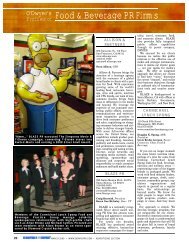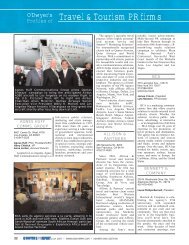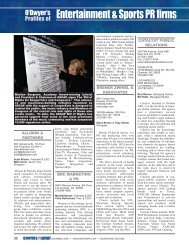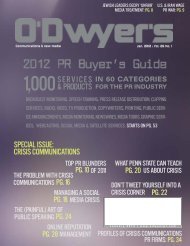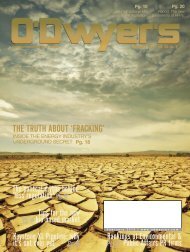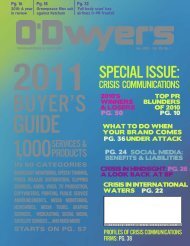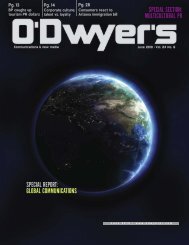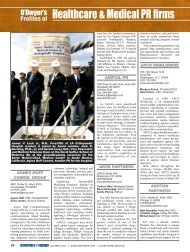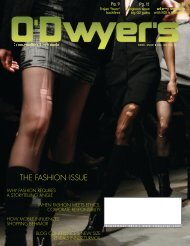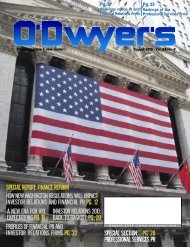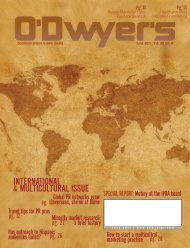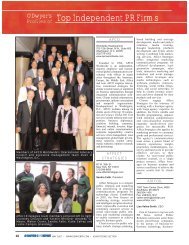PR Firm Rankings - Odwyerpr.com
PR Firm Rankings - Odwyerpr.com
PR Firm Rankings - Odwyerpr.com
You also want an ePaper? Increase the reach of your titles
YUMPU automatically turns print PDFs into web optimized ePapers that Google loves.
FEATURE<br />
Court decision leaves Net Neutrality future uncertain<br />
By Jon Gingerich<br />
Afederal appeals court in April ruled<br />
that the FCC does not have the<br />
authority to penalize tele<strong>com</strong> <strong>com</strong>panies<br />
that block or limit information on<br />
their networks.<br />
The decision is a deathblow to a series of<br />
years-long attempts by the <strong>com</strong>mission,<br />
Internet content providers and consumer<br />
rights groups who have fought to instill a<br />
legal precedent that recognizes all data on<br />
the Internet as equal, a notion that has<br />
bloomed into the cause célèbre known as<br />
Net Neutrality.<br />
The case stems from a series of 2007<br />
incidents involving tele<strong>com</strong> giant Comcast,<br />
which was accused of “packet-forging,” or<br />
using data encryption to prevent customers<br />
from accessing file-sharing application<br />
BitTorrent. Former FCC Chairman Kevin<br />
Martin said the <strong>com</strong>pany “actively interferes<br />
with Internet traffic as its subscribers<br />
try to share files online.”<br />
After a lengthy investigation, the FCC in<br />
2008 sanctioned the tele<strong>com</strong> <strong>com</strong>pany.<br />
Comcast challenged the decision, stating<br />
their actions were necessary, as sites like<br />
BitTorrent take up abnormally large<br />
amounts of bandwidth and thus pose a burden<br />
on their network. The Philadelphiabased<br />
<strong>com</strong>pany is the largest ISP in the U.S.<br />
A unanimous decision in the D.C. Circuit<br />
ruled that the FCC’s reprimand of Comcast<br />
exceeded its authority. The reason: a 2002<br />
restructuring within the <strong>com</strong>mission reclassified<br />
Internet services as different than<br />
telephone. As such, the FCC currently does<br />
not have the power to regulate these devices<br />
to the same degree, and any regulatory<br />
actions not coupled to “old” tele<strong>com</strong>munications<br />
devices fall outside its jurisdiction.<br />
Experts close to the ruling say the only<br />
way the FCC may be able to regulate<br />
Internet service issues in the future is if it<br />
restructures internal policies and reclassifies<br />
tele<strong>com</strong>munications services to fit their<br />
purview.<br />
“I think the instant reaction is that it’s a<br />
setback,” said Chris Riley, Policy Manager<br />
for the Free Press. “Congress previously<br />
gave the FCC a discretion they no longer<br />
have. This has definitely raised alarm levels<br />
for supporters of the public interest.”<br />
A step back for Net Neutrality<br />
With no laws currently in place to prohibit<br />
tele<strong>com</strong> <strong>com</strong>panies from blocking or<br />
limiting users’ access to information, critics<br />
have said the 2007 Comcast incident<br />
highlights a need for lawmakers to implement<br />
legislation that keeps service<br />
providers from blocking online content.<br />
This is the notion known as Net Neutrality,<br />
which in its broadest sense is the idea that<br />
all content on the Internet should be available<br />
for equal access.<br />
Neutrality supporters, which include<br />
consumer rights groups, content providers<br />
and Internet <strong>com</strong>panies such as Google,<br />
Yahoo!, eBay and software giant<br />
Microsoft, have asked for new federal regulations<br />
that would keep tele<strong>com</strong> <strong>com</strong>panies<br />
from be<strong>com</strong>ing Internet “gatekeepers.”<br />
These groups have expressed broadband<br />
providers could hypothetically slow down<br />
or even deny access to websites in favor of<br />
sites with whom they have financial or<br />
political affiliation.<br />
Riley posited that Comcast’s proposed<br />
merger with NBC Universal could brew<br />
one such perfect storm.<br />
“Not only does the Comcast example<br />
show they have the tools to block and control<br />
content, but we’ve also seen their<br />
incentives to do it as well,” he said. “If this<br />
merger is successful, it’s really easy to envision<br />
a scenario in which a network gives<br />
preference to what information is shown.<br />
This could effectively turn the Internet into<br />
a glorified version of cable television.”<br />
Opponents of neutrality regulation legislation<br />
typically include the national cable<br />
and telephone providers. AT&T, Verizon,<br />
Bell South, Cingular and AOL have each<br />
voiced their opposition to the neutrality<br />
amendment and have lobbied to kill bills<br />
that contain Neutrality legislation. They’ve<br />
since found support from organizations like<br />
as the U.S. Chamber of Commerce and the<br />
American Conservative Union.<br />
In a statement regarding the court decision,<br />
Comcast insisted it “remains <strong>com</strong>mitted<br />
to the FCC’s existing open Internet principles,<br />
and we will continue to work constructively<br />
with this FCC as it determines<br />
how best to increase broadband adoption<br />
and preserve an open and vibrant Internet.”<br />
Some have speculated the ruling could<br />
also pose a threat to the FCC’s ambitious<br />
plans to increase broadband service in rural<br />
U.S. areas. The plan, which would be funded<br />
by the recent sale of spectrum auctions,<br />
would give federal subsidy money to tele<strong>com</strong><br />
<strong>com</strong>panies that agree to wire rural<br />
areas currently sparse on broadband<br />
access. Many now posit the court’s decision<br />
reaffirms the idea that the FCC can’t<br />
implement federal broadband policy, and<br />
the <strong>com</strong>mission may have to tweak their<br />
envisioned plan of a wired nation. <br />
26<br />
MAY 2010 WWW.ODWYER<strong>PR</strong>.COM



